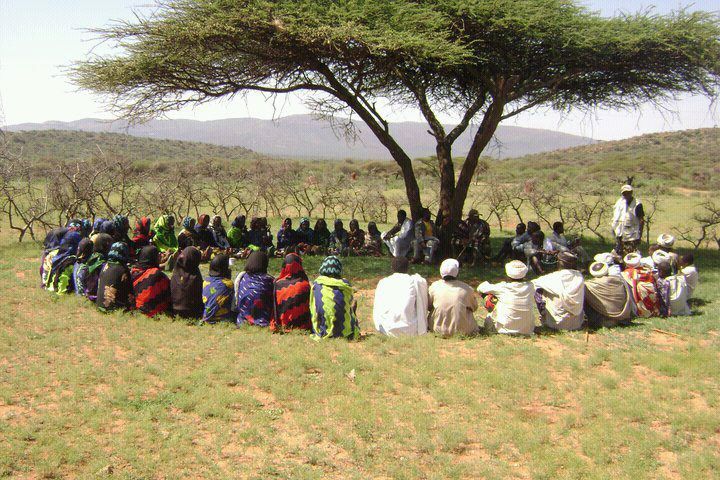
It is no secret that sometimes conflicts surface in some parts of the country fuelled by the displeased and unreformed segment of society because for them accepting the reform wafting in the length and breadth of the country grew to be a bitter pill to swallow.
As such they are seen bringing into play a wide array of divisive activities by pouring gasoline on the fire and making an effort to dismantle timeold social fabrics. It is in cognizance of the urgency of restoring the country’s tranquility ‘Lucy for Peace and Love’ tour is being carried out in a range of the country. The tour has the purpose of reigniting citizens’ deep-rooted sentiment of love, peace, solidarity aside from strengthening peopleto-people ties amongst the various Nations, Nationalities and Peoples of Ethiopia.
The Ethiopian Herald had a short stay with scholars to have their say concerning how to make peace take root in the left, right and center of the country. Prof. Ahmed Zekaria, member of Reconciliation Commission, said Ethiopians do not have a problem of unity and peace but problems pop up when the question of power comes to the scene.
Furthermore, there is no love lost in the midst of the various Nations, Nationalities and Peoples of Ethiopia. “Thus we should think of better ways to handle power. Above and beyond, we need to place much emphasis on power legitimacy as it helps all and sundry to be on the right track. But political issues frequently raised consist of economy, land, resource usage, among others. ” He continued: “In an attempt to harvest the fruit of success, we need to promote discussion and debate in a way which set the right directions.
To this effect we can draw lessons from the experience of other successful countries. If we attain this goal, our discussion will shift from right-related issues to resource management, togetherness and what have you. Therefore, the question of power legitimacy should be addressed. Psychologist Gelawdiose Alelegne for his part said, the different Nations, Nationalities and Peoples of Ethiopia have cherished corners for one another in their heart of hearts. It is to take the country to new developmental heights if they exert a concerted push.
The country is heading in the right direction but citizens do not have to leave the whole lot for the government alone. As to me, everybody should stand by its side so as to achieve the intended target. When Ethiopians work together for a common goal and help one another, they can achieve the desired goal with no trouble. He continued: “There is no gainsaying the fact that we had patiently waited for over two decades to see the lights of freedom across the country.
We had passed through many ups and downs to reach where we are today. The displeased ones spare no effort to pour cold water on our togetherness using the various social media outlets. Furthermore, we should be able to separate the sheep from the goats. Whatever happens, we should turn our back on the displeased ones who disseminate fabricated news so that the heinous give up hope and sit binding hand and foot.”
He added as long as citizens live under the umbrella of Ethiopia, they should stand together for peace, development and security. They should turn a deaf ear on cooked stories. Furthermore, teachers working at primary and secondary schools should shower students with the significance of togetherness and other related aspects.
“Sadly, most Ethiopian students know the whole lot about capitalism and socialism but they cannot put in plain words about Ethiopianism. Their knowledge about Ethiopia is skin deep. If we teach students about Ethiopianism today, when they join higher learning institutions they will have the same feelings about Ethiopia down the road,” he wrapped up. Fisseha Moreda is a PhD candidate at the Institute of Ethiopian Studies and Research under AAU.
He said, “In Ethiopia most peace or conflict researches lean on western researches. If we get the ball of African peace concept rolling, we can hit set targets given that the former excel the latter beyond a shadow of a doubt. Peace is interpreted in the western culture as the absence of war and having no structural violations. But African ways excel this reality on the ground seeing that peace is not only absence of violence but also presence of solidarity, brotherhood, harmony and sharing.
He kept on saying, though I cannot enumerate all African communities exemplary in solving conflicts, I can mention the Oromo community and Zulu community. For instance if we take the western culture, they bracket together peace with prosperity and rule of law. These two things exist in Africa.
To mention as an example the saying of Ubuntu, “A person is a person through other persons.” But this is not reflected in the western culture. One of the western philosophers pertaining to this issue says, “I think therefore I am.” This saying amplifies the attitude of focusing on oneself.
Frequently we accept peace accords which come from abroad. If there is to be peace in the world, there will be market-led transactions, development and human rights. They think that there is no peace in the absence of these elements. He stressed that their concept of peace is a far cry from that one upheld in Africa.
Therefore, we should maintain our assets instead of giving emphasis to the western culture. “We think that the concept the western country have about peace is a unique one. The Ministry of Peace has been established. But what kind of peace do we need? To understand about peace, we need to see the nature and cause of a given conflict. If we fail to do so, actualizing envisaged plan would be difficult.” he concluded.
The Ethiopian Herald, March 10/2019
BY ADDISALEM MULAT






webside er virkelig bemærkelsesværdig for folks oplevelse, godt,